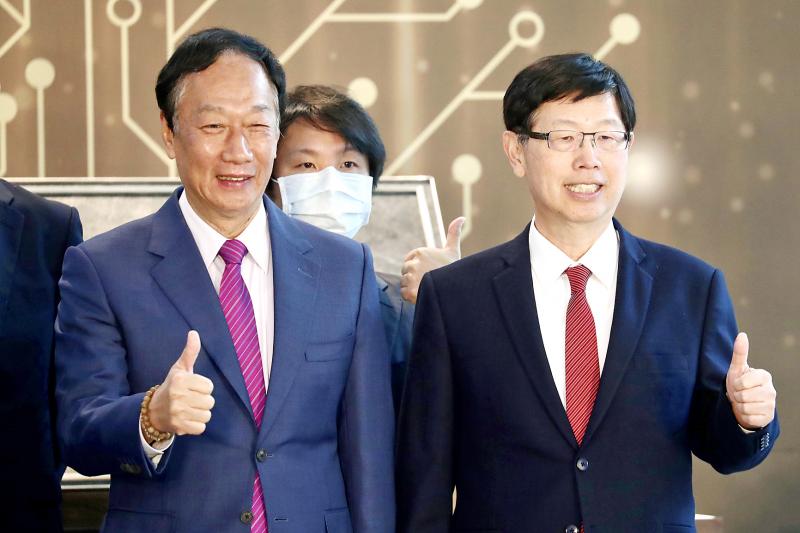Geopolitical tensions between India and China are beginning to hurt some of Taiwan’s biggest technology companies, including suppliers to Apple Inc, and hindering New Delhi’s much-vaunted incentive program for electronics manufacturing.
India has been slow to issue visas to Chinese engineers, who are needed to help Taiwanese companies set up factories in the South Asian nation, people with knowledge of the matter said on condition of anonymity.
India is also nudging companies to opt for employment permits, which are more difficult to obtain, they added.

Photo: Ritchie B. Tongo, EPA-EFE
The wrangling might delay Indian Prime Minister Narendra Modi’s plan to bolster India’s manufacturing capacity and deter overseas investors, who invested US$30 billion in the six months to September last year, with the maximum foreign direct investment flowing in the computer hardware and software sector.
The companies are looking to India to diversify their supply chains.
Modi has banned hundreds of Chinese apps and slowed approvals for Chinese investment after a deadly clash along the disputed border between the two neighbors.
Last year, companies such as iPhone assemblers — Hon Hai Precision Industry Co (鴻海精密), known internationally as Foxconn Technology Group (富士康科技集團); Pegatron Corp (和碩); and Wistron Corp (緯創) — along with many others pledged US$1.5 billion to set up mobile phone plants in India after the Modi government offered them specially designed incentives to manufacture their products locally for global export.
The move was also expected to shift supply lines to India from China.
Apart from delays in granting visas, the Indian government has indicated a preference for issuing employment visas instead of business visas for people required to set up the production lines that are being imported by companies, the people said.
Employment visas typically require more paperwork and background checks from the Indian Ministry of Home Affairs, and could therefore be the reason for India’s insistence. Business visas also have a shorter duration.
Companies have balked at the employment permits because it increases costs. It also leads to double taxation for engineers and technicians, as they continue to be employed by their respective companies in China.
Skilled professionals and experts are also needed for training and guidance on machines that are being installed for the first time in the country, along with specialists to monitor the entire process.
The development comes at a time when New Delhi is under pressure to boost growth in Asia’s third-largest economy, which is set for its worst annual contraction since 1952 with millions losing their jobs and being pushed into poverty due to the COVID-19 pandemic.
The incentive program for mobile makers alone envisages the production of 10.5 trillion rupees (US$145.5 billion) of smartphones and exports of 6.5 trillion rupees over the next five years. It is likely to create more than 800,000 jobs.
Chinese Ministry of Foreign Affairs spokeswoman Hua Chunying (華春瑩) yesterday said that she was not aware of visa delays by India for Chinese engineers, and referred questions to the Indian authorities.
Asked whether Indian workers faced delays coming to China, she said that Beijing is “flexibly adjusting” its border entry measures.
“We are willing to uphold an orderly flow of personnel,” she said.

‘ABUSE OF POWER’: Lee Chun-yi allegedly used a Control Yuan vehicle to transport his dog to a pet grooming salon and take his wife to restaurants, media reports said Control Yuan Secretary-General Lee Chun-yi (李俊俋) resigned on Sunday night, admitting that he had misused a government vehicle, as reported by the media. Control Yuan Vice President Lee Hung-chun (李鴻鈞) yesterday apologized to the public over the issue. The watchdog body would follow up on similar accusations made by the Chinese Nationalist Party (KMT) and would investigate the alleged misuse of government vehicles by three other Control Yuan members: Su Li-chiung (蘇麗瓊), Lin Yu-jung (林郁容) and Wang Jung-chang (王榮璋), Lee Hung-chun said. Lee Chun-yi in a statement apologized for using a Control Yuan vehicle to transport his dog to a

Taiwan yesterday denied Chinese allegations that its military was behind a cyberattack on a technology company in Guangzhou, after city authorities issued warrants for 20 suspects. The Guangzhou Municipal Public Security Bureau earlier yesterday issued warrants for 20 people it identified as members of the Information, Communications and Electronic Force Command (ICEFCOM). The bureau alleged they were behind a May 20 cyberattack targeting the backend system of a self-service facility at the company. “ICEFCOM, under Taiwan’s ruling Democratic Progressive Party, directed the illegal attack,” the warrant says. The bureau placed a bounty of 10,000 yuan (US$1,392) on each of the 20 people named in

The High Court yesterday found a New Taipei City woman guilty of charges related to helping Beijing secure surrender agreements from military service members. Lee Huei-hsin (李慧馨) was sentenced to six years and eight months in prison for breaching the National Security Act (國家安全法), making illegal compacts with government employees and bribery, the court said. The verdict is final. Lee, the manager of a temple in the city’s Lujhou District (蘆洲), was accused of arranging for eight service members to make surrender pledges to the Chinese People’s Liberation Army in exchange for money, the court said. The pledges, which required them to provide identification

INDO-PACIFIC REGION: Royal Navy ships exercise the right of freedom of navigation, including in the Taiwan Strait and South China Sea, the UK’s Tony Radakin told a summit Freedom of navigation in the Indo-Pacific region is as important as it is in the English Channel, British Chief of the Defence Staff Admiral Tony Radakin said at a summit in Singapore on Saturday. The remark came as the British Royal Navy’s flagship aircraft carrier, the HMS Prince of Wales, is on an eight-month deployment to the Indo-Pacific region as head of an international carrier strike group. “Upholding the UN Convention on the Law of the Sea, and with it, the principles of the freedom of navigation, in this part of the world matters to us just as it matters in the